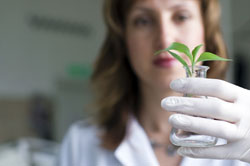Sweet success for cryopreservation techniques
Worldwide, thousands of plant species are threatened with extinction. Not only that, many more yet undiscovered varieties may be disappear due to the abuse of our planet's resources. The global move by scientists then to preserve plant germplasm to halt this spiral of destruction is a welcome development. The objectives of the European project CRYMCEPT aimed to determine reliable methods of cryopreservation. All too often, the preserved material fails to rejuvenate after thawing and the scientists researched existing protocols to determine the biochemical mechanisms involved. Factors taken into account included type and age of tissue and plant species, all of which give rise to a host of variable conditions. The research team at the Institut de Recherche pour le Développement in Montpelier France investigated the role of sucrose in the success of different methods of cryopreservation. Using sucrose analysis techniques with an accuracy level as low as 1mg, the results showed that plants pretreated with sucrose showed an enhanced cryotolerance. Utilising sucrose therefore, the number of trial and error tests needed before a protocol is set up, would be reduced. This should increase the speed with which species can be introduced into a European germplasm cryobank. Despite notes of caution due to the fact that in some cases, sucrose treatment does not confer cryotolerance, the results look promising. As a base for further research, they are likely to offer considerable improvements in the move towards successful preservation of our genetic heritage.



